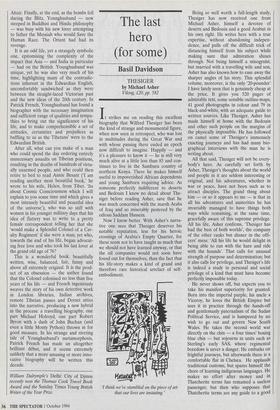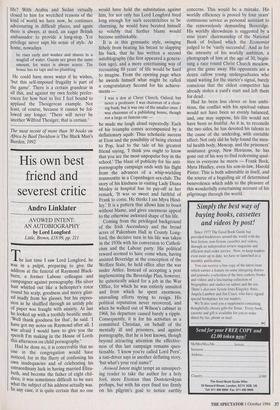The last hero (for some)
Basil Davidson
THESIGER by Michael Asher Viking, £20, pp. 582 It strikes me on reading this excellent biography that Wilfred Thesiger has been the kind of strange and monumental figure, when now seen in retrospect, who was lost in multitudes during the Great War and with whose passing there ended an epoch now difficult to imagine. Happily — and it's a pleasure to know it — he is still very much alive at a little less than 85 and con- tinues to live in the Samburu country of northern Kenya. There he makes himself useful to impoverished African dependents and young Samburu requiring 'advice. As someone perfectly indifferent to deserts and Bedouin I knew no detail about The- siger before reading Asher, save that he was much concerned with the marsh Arabs of Iraq and so miserably pestered by the odious Saddam Hussein.
Now I know better. With Asher's narra- tive one sees that Thesiger deserves his notable reputation, less for his heroic crossings of Arabia's Empty Quarter, for these seem not to have taught us much that we should not have learned anyway, or that the oil companies would not soon have found out for themselves, than the fact that his life-story makes a kind of grand and therefore rare historical artefact of self- embodiment.
`I think we've stumbled on the piece of art that our lives are imitating.' Being so well worth a full-length study, Thesiger has now received one from Michael Asher, himself a devotee of deserts and Bedouin and a good Arabist in his own right. He writes here with a true expertise, without abandoning indepen- dence, and pulls off the difficult trick of distancing himself from his subject while making sure that admiration shines through. Not being himself a misogynist, but married with a travelling wife and son, Asher has also known how to ease away the sharper angles of his story. This splendid volume, moreover, is the only '20-pounder' I have lately seen that is genuinely cheap at the price. It gives you 520 pages of admirable text, some sensible outline-maps, 41 good photographs in colour and 79 in black-and-white, with an adequate guide to written sources. Like Thesiger, Asher has made himself at home with the Bedouin and other such people on the margins of the physically impossible. He has followed on camel some of Thesiger's immensely exacting journeys and has had many bio- graphical interviews with the man he is writing about.
All that said, Thesiger will not be every- body's hero. As carefully set forth by Asher, Thesiger's thoughts about the world and people in it are seldom interesting or original, and his adventures, whether in war or peace, have not been such as to attract disciples. The grand thing about him — or so it appears to me — is that in all his adventures and austerities he has invariably managed to have things both ways while remaining, at the same time, gracefully aware of this supreme privilege. All his life, Asher confirms, ‘Thesiger has had the best of both worlds', the company of the other ranks but dinner in the offi- cers' mess: 'All his life he would delight in being able to run with the hare and ride with the hounds'. That calls for unusual strength of purpose and determination; but it also calls for privilege, and Thesiger's life is indeed a study in personal and social privilege of a kind that must have become perfectly impossible today.
He never shows off, but expects you to take his manifest superiority for granted. Born into the imperial purple, his uncle a Viceroy, he loves the British Empire but sees it in practice through the hands-off and gentlemanly paternalism of the Sudan Political Service, and is hampered by no wish to go out and govern New South Wales. He takes the second world war directly on the chin — a four times' boxing blue chin — but sojourns in units such as Sterling's early SAS, where regimental boredom is never a danger. He embarks on frightful journeys, but afterwards there is a comfortable flat in Chelsea. He applauds traditional customs, but spares himself the chore of learning indigenous languages. He makes no effort after money and in Thatcherite terms has remained a useless passenger, but then who supposes that Thatcherite terms are any guide to a good life? With Arabia and Sudan virtually closed to him for wretched reasons of the kind of world we have now, he continues adventuring in difficult places, and again there is always, at need, an eager British ambassador to provide a long-stop. Yet privilege never saps his sense of style. At home, nowadays
he rises early and washes and shaves in a mugfull of water. Guests are given the same amount, for water is always scarce. The house has no taps and no plumbing.
He could have more water if he wishes, `but this self-imposed frugality is part of the game'. There is a certain grandeur in all this, and against my own feeble prefer- ences for how best to live I feel bound to applaud the Thesigerean example. Not least, of course, because it cannot be fol- lowed any longer. 'There will never be another Wilfred Thesiger, that is certain.'
The most recent of more than 30 books on Africa by Basil Davidson is The Black Man's Burden, 1992.



























































 Previous page
Previous page